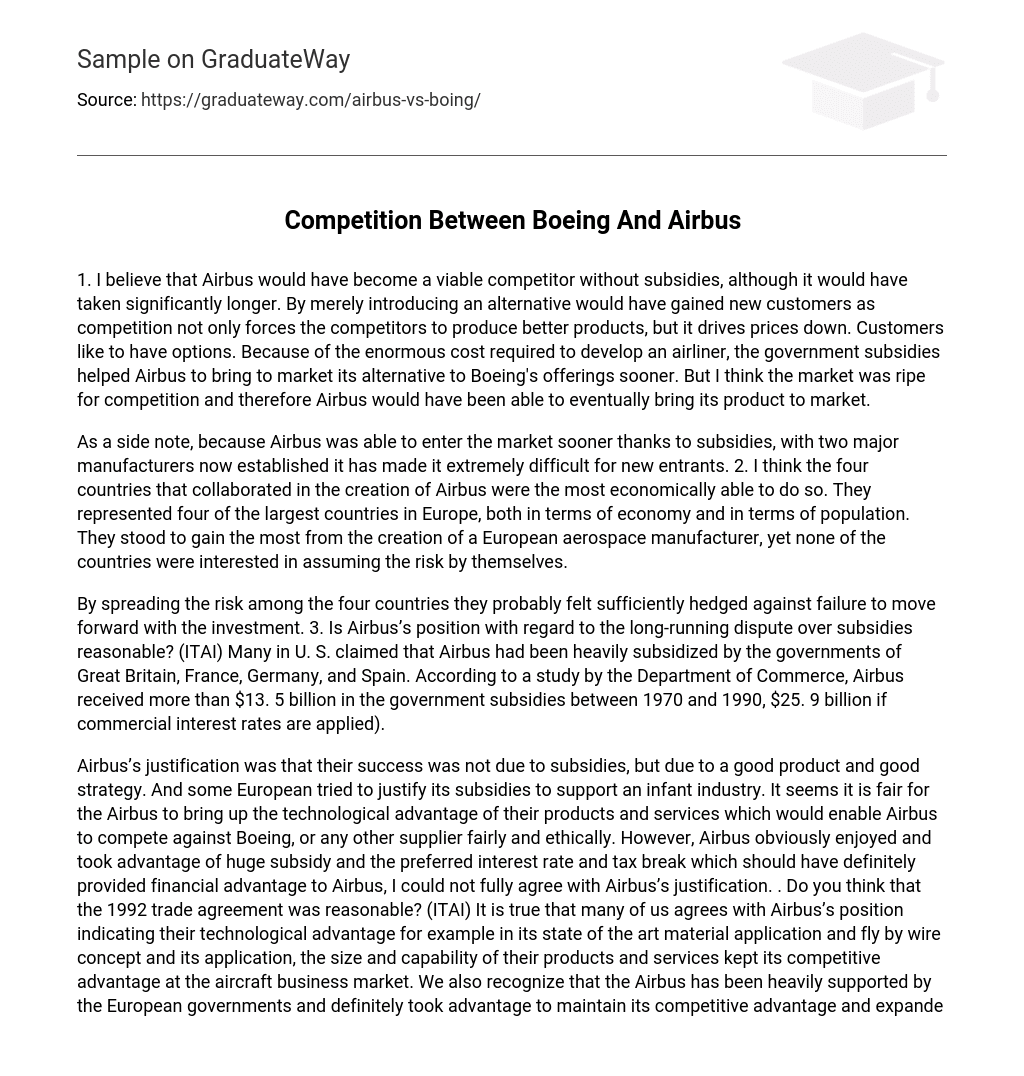Even without government subsidies, I believe Airbus would have become a strong competitor to Boeing. However, it would have taken them longer to achieve success. By offering an alternative option, Airbus would have attracted new customers and encouraged improvement and price reduction through competition. Customers value having multiple choices. The subsidies were vital in helping Airbus bring its alternative product to the market earlier, as manufacturing an airliner involves significant development costs. Nonetheless, I am certain that the market was ready for competition and that eventually Airbus would successfully launch its product.
Thanks to subsidies, Airbus managed to enter the market before its competitors, creating a challenge for new entrants now that two major manufacturers have been established. Consequently, I believe that the four countries responsible for founding Airbus had the economic capability to do so. These countries were among Europe’s largest in terms of both economy and population. However, despite standing to benefit the most from establishing a European aerospace manufacturer, none of these countries were willing to take on the risk individually.
By diversifying the risk across the four countries, they probably felt sufficiently safeguarded against potential investment failure. 3. Is Airbus’s position on the ongoing subsidy dispute justified? (ITAI) Many people in the U.S. argued that Airbus had received substantial subsidies from Great Britain, France, Germany, and Spain governments. According to a study conducted by the Department of Commerce, Airbus was provided with more than $13.5 billion in government subsidies from 1970 to 1990 (or $25.9 billion when considering commercial interest rates).
According to Airbus, their success is attributed to their good product and strategy rather than subsidies. While some Europeans argue in favor of supporting an emerging industry through subsidies, Airbus believes it is fair to highlight the technological advantages of their products and services that allow them to compete fairly against Boeing and other suppliers. However, it is evident that Airbus has benefited from significant subsidies, as well as preferential interest rates and tax breaks. Despite their justifications, I find it challenging to fully agree with Airbus’s standpoint on this matter. Do you believe the 1992 trade agreement was reasonable? (ITAI)
Many of us support Airbus’s position by acknowledging their technological advantage in areas such as advanced materials and fly by wire technology. The size and capabilities of their products have helped them maintain a competitive edge in the aircraft business market. We also acknowledge that Airbus has received substantial support from European governments and has taken full advantage of it to further expand its market share, as mentioned in our earlier response to question 3.
The European Commission estimated that Boeing and McDonnell Douglas received indirect government aid totaling $18-22 billion between 1976 and 1990. The study also found that the Department of Defense supported commercial aircraft operations with benefits worth $6.34 billion, while NASA contributed $8 billion. Additionally, Boeing and McDonnell Douglas were granted tax exemptions amounting to $1.7 billion and $1.4 billion respectively. Consequently, based on this information, it seems that both companies are encountering comparable situations.
The 1992 agreement placed a limit on direct government subsidies for new airplane development costs, capping it at 33% of the total cost and setting a payment timeframe of 17 years. Evaluating what is considered reasonable or not may be challenging, but it is widely recognized that the commercial aircraft business is closely intertwined with the larger aircraft manufacturing industry, which often has strong ties to the government, military, and national defense operations.
Both parties should agree on a trade agreement to establish restrictions for fair competition among firms and suppliers. The caution of the U.S. industry in reopening the trade dispute in 1993 was due to their successful sales and reluctance to jeopardize their existing deals. In an era of global competition, antitrust authorities permit the formation of large domestic firms through mergers and acquisitions to maintain competition and prevent tacit collusion, thereby keeping prices fair. The argument on whether the EU authorities’ threat of declaring the Boeing McDonnell Douglas merger illegal violated U.S. national sovereignty has two perspectives.
On one hand, the US government has the final say on whether mergers of domestic firms are appropriate, making EU intervention a violation of US sovereignty. On the other hand, since these firms operate in Europe, a merger would impact European firms. Therefore, the EU has a legitimate point in regulating firms that conduct significant business in the EU. However, the EU’s action in summer 2001 raises doubts as it overturned a merger between two US companies, Honeywell and General Electric, which already had approval from US governmental agencies. The EU argued that the merged company would not benefit European consumers and prohibited the merger.
8. Do you believe the EU Commission had a strong case for demanding concessions from Boeing in their merger with McDonnell Douglas? Was it justifiable for Boeing to make significant concessions to the EU? It is a subjective matter, allowing for multiple points of view. Overall, the EU had a challenging case and likely aimed to extract concessions from Boeing.
The concessions, although not substantial, were not of great importance due to airlines having strong incentives to stick with a single supplier, which reduces maintenance and spare parts costs. Without these concessions, the EU would have had to find an alternative way to justify their reluctant acceptance of the merger. However, with the concessions being made, the EU gained strength, garnered confidence from European consumers, and could act confidently in the GE/Honeywell deal.





